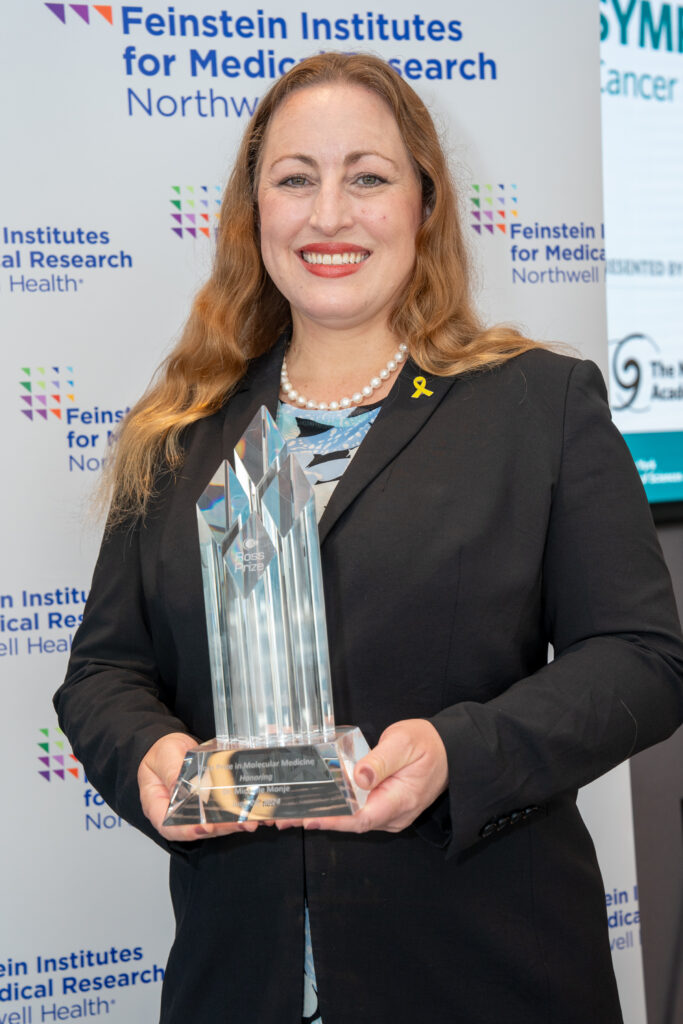Discovering Cancer Therapies through Neuroscience
The 2024 recipient of the Ross Prize in Molecular Medicine is exploring the interactions between cancer cells and the nervous system.
Published November 11, 2024
By Megan Prescott, PhD
Program Manager for Life Sciences

What does it take to pioneer a new field of science? For Michelle Monje, MD, PhD, the key is humility, collaboration, and resilience.
Prof. Monje, the Milan Gambhir Professor of Pediatric Neuro-Oncology at Stanford University School of Medicine, was awarded the 2024 Ross Prize in Molecular Medicine, administered by the Feinstein Institutes for Medical Research and the journal Molecular Medicine, for her outstanding contributions to research relating to the neuroscience of cancer and its implications for therapy.
“Winning the Ross Prize is an enormous honor,” said Prof. Monje. “It’s wonderful to see cancer neuroscience being recognized in this way because it has so much potential for clinical translation and the potential to improve outcomes for very difficult-to-treat cancers. I’m just absolutely delighted to see this recognition shine a light on this emerging field.”
The emerging field of cancer neuroscience explores interactions between cancer cells and the components of the nervous system—neurons, astrocytes, oligodendrocytes, microglia, Schwann cells and peripheral nerves—and the effects of these interactions on cancer initiation, progression, the tumor immune microenvironment and metastasis. It differs from closely related fields like neuro-oncology in distinct ways.
“Cancer neuroscience is a field at the intersection of neuroscience and cancer biology and it recognizes, what is increasingly appreciated, as the critical role of the nervous system in driving malignancy,” Prof. Monje explains. “Neuro-oncology concerns itself with a particular type of cancer emerging from, or occurring within, the nervous system. Cancer neuroscience includes not only those tumors, but also really every cancer, as it’s influenced by either the central or peripheral nervous system.”
Humility, Collaboration, Resilience
Prof. Monje received her MD and PhD in neuroscience from Stanford University and completed her residency training in neurology at the Mass General Brigham program in Boston. She then returned to Stanford for a clinical fellowship in pediatric neuro-oncology. She chose this field because she “recognized very early on that our therapies for many diseases of the nervous system and especially brain cancers are truly insufficient”, in part because “there’s still so much to be learned and so much that is unknown; I felt that in order to help my patients with brain cancers that I needed a much deeper basic understanding of the normal processes from which these tumors emerge,” she explained.
Prof. Monje believes her open-minded approach to her work is a contributing factor for her success.
“I’m constantly humbled by the lack of treatment options I have for most of my patients in neuro-oncology, the kinds of toxicities that those therapies can cause to the nervous system, and our need to do better by understanding more,” she said.
A crucial factor for success in an emerging field that intersects multiple disciplines is collaboration.
“Reaching out to expert immunologists and learning as much as I can from them has been really valuable, as we’ve discovered potential new therapeutic strategies for these terrible brain cancers that occur in children,” she says, adding that her work with Crystal Mackall, MD, has led to the first-ever CAR-T cell clinical trial for children with diffuse midline glioma (DIPG).
Prof. Monje also cites resilience as a primary driver in her success.
“The newest and sometimes most interesting ideas are the hardest ones to get through publication acceptance. It’s often hard when you have a new perspective, but if you believe in it, and you believe it’s true and important, you have to stick with it and keep beating that drum,” she says.
Connecting Neuroscience, Immunology, and Neuro-Oncology
Prof. Monje is committed to broadening her understanding of cancer neuroscience. Her research focuses on the connections between neuroscience, immunology, and neuro-oncology. Specifically, she studies the intricate communication between neurons and glial cells in normal and disease brain function. Her work has revealed how cancer cells can exploit this process to drive tumor growth in brain cancers. She is excited to see this field grow and the potential for the development of new therapies for cancer patients.
“There’s a fascinating crosstalk between the nervous system, the immune system, and cancers that I think are critically important, not only for the fundamental ways that these tumors grow and progress, but because they need to be understood in order for us to successfully leverage really promising immune therapies,” she says. “So, I’m very excited about this intersection of three fields that is occurring within cancer neuroscience.”
Exploring how cancer takes advantage of normal mechanisms of the development and plasticity of the brain, the field of cancer neuroscience can also lead to insight into the mechanisms of normal brain development that are important for learning and memory. Additionally, this may better our understanding of the development of other diseases ranging from epilepsy to opiate addiction.
“There’s been a wide range of implications for the lessons we’ve learned, from cancer, by studying the neuroscience,” Prof. Monje explains.
Ultimately, for Prof. Monje, the greatest driver of her success in advancing the field of cancer neuroscience is her patients.
“I feel so inspired after returning from clinic to ask very specific questions in the laboratory. Not only about the disease, but also about the normal nervous system,” she explains. “Throughout my career, the privilege of taking care of patients has really guided the basic science that we do.”
